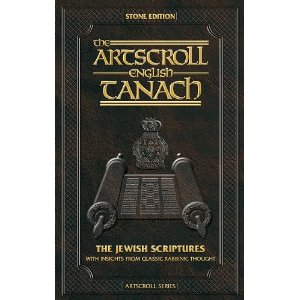The Artscroll English Tanach--Rabbi Nosson Scherman
Apart from the odd character important to Mathematics and perhaps a few others (chaim), I have long since lost whatever Hebrew had come to me as a child. I could not more read a line than I could Sanskrit, which is a shame. I am a collector of Bibles and of Bible text and have an interlinear Greek and have always had it in mind to have in interlinear Hebrew, but have never gotten around to purchasing one.
This book, however, will join my collection of Bibles as a prize in the collection. I am not a scholar of the Talmud nor the Midrash, so I cannot comment on how valid the "insights from classic rabbinic thought" are. However, they are fascinating and add a new dimension to reading "The Jewish Bible."
The text is presented in a way unfamiliar to most Christian readers of Biblical Texts. It is presented, one assumes, in the classic Jewish fashion--the Torah (the five books of Moses) The Prophets--among which we find Joshua, Judges, I and II Samuel, I and II Kings , and the writings--culminating in I and II Chronicles.
The translation is at times awkward. For example, take this passage from the beginning of the book of Genesis:
From The Artscroll English TanachThere is something perfect about the phrase "astonishingly empty." But the interpolation of the clause within em-dashes makes the reading the whole somewhat awkward.
In the beginning of God's creating the heavens and the earth--when the earth was astonishingly empty, with darkness upon the surface of the deep, and the Divine Presence hovered upon the surface of the waters--God said, "Let there be light," and there was Light. God saw that the light was good.
The comments on this passage provide interesting insights:
1:1 The Hebrew phrase, Bereishis barah Elohim, is commonly rendered In the beginning God created, which would indicate that the Torah is giving the sequence of Creation--that God created the heaven, the earth, darkness, water, light, and so on. However , Rashi and Ibn Ezra maintain that this verse cannot be chronological; our translation follows their view.I don't know about other readers, but the comment on 1.4 comes as something of a surprise-an interesting and powerful insight into the text. Of course, I'm sure that the scholars that produced this bible would acknowledge that that is not the full meaning--but this view of it provides a depth otherwise not available to those less acquainted with the nuance.
1.4 Throughout the narrative, the term ki tov, [it] was good, means that the creation of the item under discussion was completed.
Consider these comments on the ten commandments:
[Exodus] 20:9-10 The commandment of the Sabbath includes not only deed, but attitude, for when the Sabbath arrives, one should feel that all his work is finished, even though his desk or workbench is still piled high. Six days shall you work and accomplish all your work means that no matter what is still left to be done, one should feel as much at ease as if everything were finished (Rashi).This last certainly provides deep background on why Jesus can tell us that if we call our brother "Thou fool," we have committed murder in our hearts.
20:13 Sixth Commandment: Prohibition against murder Mechlita noes that the first commandment of the second table corresponds to the first of the other one, faith in God. Someone with true belief in God as the Creator and Sustainer of life will not murder.
Although the Hebrew lo tirtzach would usually be translated as do not murder, we prefer "kill" in this context because murder, by definition, means "with malice aforethought," but this prohibition includes manslaughter, as well.
The Sages extend this prohibition to include such moral crimes as publicly embarrassing someone or causing someone to lose his livelihood.
The translation is full of these insights. The only qualification I have to comment on the validity of the commentary is to say that it makes profound sense---it adds to my appreciation of these ancient writings. By reading this commentary, one comes to see and understand better God and his actions in human history. One participates in the long tradition of reading and praying scriptures and shares the insights of the great Jewish scholars and thinkers. This is a wonderful gift to those of us who haven't the training or ability to glean these insights from the original sources. They are only highlights--but highlights that encourage us to move toward deeper study.
Highly recommended *****

Comments
Post a Comment